|
|
|
Sort Order |
|
|
|
Items / Page
|
|
|
|
|
|
|
| Srl | Item |
| 1 |
ID:
151311


|
|
|
|
|
| Summary/Abstract |
The emergence of targeted sanctions in the mid-1990s was due to the humanitarian impact of embargoes, which were deemed unacceptable and compelled senders to shift to measures designed to affect only wrongdoers. Twenty years on, the present paper considers the extent to which autonomous sanctions are designed to affect those individuals and elites responsible for the behaviour the EU aims to condemn. How faithful has the EU remained to this concept in its sanctions policy? The enquiry scrutinizes diverse practices in three established sanctions strands of the EU, development aid suspensions, Common Foreign and Security Policy (CFSP) sanctions and Generalised Scheme of Preferences (GSP) withdrawals. It shows that it has been more faithfully implemented in some strands of EU sanctions than in others. Specifically in the flagship CFSP sanctions practice, the due process motivated court challenges of its blacklists have led the EU to modify selection criteria in a way that renders them potentially less targeted.
|
|
|
|
|
|
|
|
|
|
|
|
|
|
|
|
| 2 |
ID:
052917
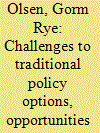

|
|
|
| 3 |
ID:
151315
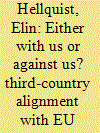

|
|
|
|
|
| Summary/Abstract |
Since the mid-1990s, selected neighbours have in impressive numbers aligned with European Union (EU) foreign policy sanctions. However, much more than for any other sanctions case, neighbours have declined joining recent measures against Russia/Ukraine. This article uses freshly gathered data from the entire period of the Common Foreign and Security Policy (CFSP) to analyse how the practice of alignment influences international relations in Europe. Thereby, the article demonstrates that: (1) sanctions are not a two-party game, but an instrument that impacts broadly on relations with third countries; (2) alignment with sanctions not only articulates similarity, but contributes to normative polarization in wider Europe; (3) for a high-salience case such as Russia sanctions, neighbours are reluctant to be instrumentalized for EU foreign policy purposes.
|
|
|
|
|
|
|
|
|
|
|
|
|
|
|
|
| 4 |
ID:
074224


|
|
|
|
|
| Publication |
2005.
|
| Summary/Abstract |
Using the empirically driven case study of the European Union's response to the Bosnian civil war 1992–95 this article assesses the effectiveness of the Common Foreign and Security Policy (CFSP), through Christopher Hill's ‘capabilities–expectations gap framework’. In assessing effectiveness it explores both the expectations placed on the EU and the capabilities the Union was able to deploy. Moreover, this research suggests that the EU was ineffective in responding to the Bosnian crisis. The EU pursued a rigid strategy of diplomatic and economic foreign policy, failing to generate the political will to attempt alternative approaches. This research argues that the capabilities–expectations gap framework is a useful tool for conceptualising the EU's effectiveness but that it under-specifies the importance of the end result of the policy.
|
|
|
|
|
|
|
|
|
|
|
|
|
|
|
|
| 5 |
ID:
052867
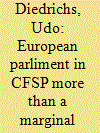

|
|
|
|
|
| Publication |
Apr-Jun 2004.
|
|
|
|
|
|
|
|
|
|
|
|
|
|
|
|
| 6 |
ID:
079131
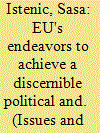

|
|
|
|
|
| Publication |
2007.
|
| Summary/Abstract |
Regionalism and interregionalism have become tools for diplomacy in the post-Cold War era. Successful European integration has heightened the European Union's (EU) desire to become a more effective global actor in international security. The Taiwan Strait is one of the most dangerous flash-points which might trigger a war in Asia. Escalation of the crisis in the Taiwan Strait would undeniably have severe economic, political, and perhaps even military implications for the EU. In the light of the EU's emerging regionalism with East Asia and its efforts to achieve a discernible political and security role in the region, there is an increasing awareness in the EU of the need for it to develop its own security perspective on China and to form its own approach toward the contentious cross-Strait issue
|
|
|
|
|
|
|
|
|
|
|
|
|
|
|
|
| 7 |
ID:
186082
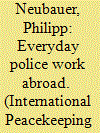

|
|
|
|
|
| Summary/Abstract |
Nowadays, police officers are regularly deployed as members of multilateral peace operations. This article examines how these experts implement their mandates and how we can understand their activities. For this, we draw on a set of 90 semi-structured interviews with European police experts who have experience in multilateral policing. We find that, to navigate their work abroad, European police officers primarily rely on their own domestic policing experience, their experience from previous deployments and the experience of colleagues they meet in the mission. The extent to which they can rely on their own experience is shaped by how much discretion they find at their disposal. We identify two conditions limiting their discretion: the preferences, policies and histories of host states, and institutional lock-in effects within missions that reduce officers’ room to manoeuvre over time. While we also find that officers do not normally draw on international guidance documents in their everyday work, missions can nevertheless be regarded as sites where more localized transnational policing practices emerge. These mission-specific transnational practices are formed, over time, by successive cohorts of police officers from different countries.
|
|
|
|
|
|
|
|
|
|
|
|
|
|
|
|
| 8 |
ID:
075099
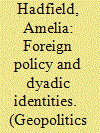

|
|
|
|
|
| Publication |
2006.
|
| Summary/Abstract |
The Common Foreign and Security Policy (CFSP) is a foreign policy tool that continues to defy easy description. It is a focal point of intergovernmental forces protecting their foreign policy-making power and also a forum for increasingly supranational coordination of all member states on EU third-party issues that has bestowed a quality of 'actorness' upon the EU. Introducing the role of identity to judge the national and trans-national tensions inherent in EU foreign policy making, the CFSP is seen to operate as a locale of dyadic identity construction, juxtaposing national and collective forms of self-reference in an effort to produce workable outputs and lend consistency to EU actorness. Following the existential questioning of a post-Constitution EU, common foreign policy making may require alternative approaches to the confines of the CFSP. The use of 'enhanced cooperation' encouraging groups of states to guide EU foreign policy is a possible remedy to the quantitative problems inherent in coordinating twenty-five policy stances and the qualitative attributes that reveal national identity as deeply connected to foreign policy practices.
|
|
|
|
|
|
|
|
|
|
|
|
|
|
|
|
| 9 |
ID:
112751
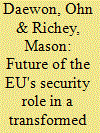

|
|
|
|
|
| Publication |
2012.
|
| Summary/Abstract |
A fundamentally new security landscape is unfolding in East Asia due to the
changing power structure among the great powers, particularly owing to the fast
rise of China and the relative decline of the United States. This paper analyzes the
dynamics of power transition in East Asia and assesses the possibility of the EU
playing a meaningful role in the strengthening of security governance in the
region. It begins by arguing that although the East Asian region is entering a
transformation stage it will not likely lead to a major collision between the United
States and China. This means the EU will have opportunities to become involved
in East Asian security affairs, provided it further strengthens its multi-faceted,
comprehensive engagement policies vis-à-vis the region. We focus particularly
on the EU's ability to promote the positive aspects of East Asian regionalism via
deepened and expanded cooperative measures such as bilateral and multilateral
framework agreements with regional countries and organizations. In addition to
offering a reliable model for regional security governance, the EU will be able to
contribute to regional security by cooperating with the United States and other
East Asian countries and organizations in selected security issues, such as sea-lane
protection, counter-terrorism, non-proliferation of Weapons of Mass Destruction
(WMD), humanitarian operations, etc. Internally, we show that after the Treaty of
Lisbon the EU is approaching incrementally a position wherein it can make
greater CFSP/CSDP engagements-particularly those associated with peacekeeping/
peacemaking and humanitarian operations-in the wider world including East
Asia.
|
|
|
|
|
|
|
|
|
|
|
|
|
|
|
|
| 10 |
ID:
080023
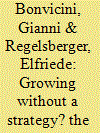

|
|
|
|
|
| Publication |
2007.
|
| Summary/Abstract |
Contrary to the expectations of many experts and politicians, one of the most politically sensitive sectors of the European integration process, the common foreign and security policy, has seen remarkable growth in recent years. The pressure of crises and conflicts beyond the EU's borders and the need to deal with them in a unitary way has driven the governments of member states and the community institutions to take development of CFSP/ESDP more seriously. The process has been pragmatic, establishing the mechanisms and policies required to respond to the challenges. It is this bottom-up, disorderly growth that the Constitutional Treaty had attempted to rationalise in a coherent framework, completing the work of the preceding treaties. With the stalled ratification of the CT, this growth has continued. But it cannot go on indefinitely. In order to bring order and coherence into CFSP/ESDP bodies and procedures, the substance of the Constitutional Treaty must be saved and approved rapidly
|
|
|
|
|
|
|
|
|
|
|
|
|
|
|
|
| 11 |
ID:
117508
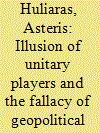

|
|
|
|
|
| Publication |
2012.
|
| Summary/Abstract |
Journalists, academics and politicians portray the European Union and China as unitary actors that follow coherent strategies towards 'Africa'. These perceptions help in turn to sustain a discourse of geopolitical competition: the EU and China are presented as bitter rivals of a new 'Cold War'. This 'new scramble for Africa' narrative is an illusion. Despite official declarations, Brussels' ties with 'Africa' are only a small part of a complex web of relationships. Moreover, China's presence in Africa is far less monolithic than outside observers assume. However, these flawed perceptions are quite persistent because they serve the ambitions and interests of governing elites.
|
|
|
|
|
|
|
|
|
|
|
|
|
|
|
|
| 12 |
ID:
052556
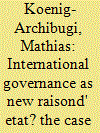

|
|
|
| 13 |
ID:
108662


|
|
|
|
|
| Publication |
2011.
|
| Summary/Abstract |
European leaders frequently vaunt the European Union's distinctiveness in adopting and pursuing a comprehensive approach to security. The EU's profile as an international actor is designed to span across all dimensions of security. As a result, its security policy portfolio involves a large number of institutional actors and policies that need to be coordinated. The ambition of the EU to provide security in a comprehensive manner raises challenges at the politico-strategic level, at the level of operational and policy planning and in day-to-day implementation. So far, the field is lacking an inclusive analytical framework for the analysis of providing security through a distinctively comprehensive civil-military, economic and political organisation. This article seeks to close this gap by providing suggestions for how the wide range of issues related to comprehensive security could be structured, and by framing the matter theoretically and with reference to existing conceptual work and empirical research.
|
|
|
|
|
|
|
|
|
|
|
|
|
|
|
|
| 14 |
ID:
017527


|
|
|
|
|
| Publication |
Summer 2000.
|
| Description |
13-30
|
|
|
|
|
|
|
|
|
|
|
|
|
|
|
|
| 15 |
ID:
087007


|
|
|
|
|
| Publication |
2009.
|
| Summary/Abstract |
When the European Union started its Common Foreign and Security Policy (CFSP), it left the elaboration and implementation of decisions having defense implications for the Western European Union (WEU) for the next six years. NATO partners Norway, Iceland, and Turkey were invited as "associate members," enabling them to participate in the activities and regular meetings of the WEU Council. This paper argues that the WEU arrangement could serve as an example for an interim arrangement for areas of mutual interest. After an examination of past practice on CFSP and European Security and Defense Policy (ESDP), the paper formulates possible future options not only in the security field but also in energy, justice, and home affairs in combating organized crime, a new "economic zone," and the implications of the EU Neighborhood Policy, where institutional and practical arrangements might serve as milestones in the negotiating process without detracting from the ultimate objective of full membership.
|
|
|
|
|
|
|
|
|
|
|
|
|
|
|
|
|
|
|
|
|